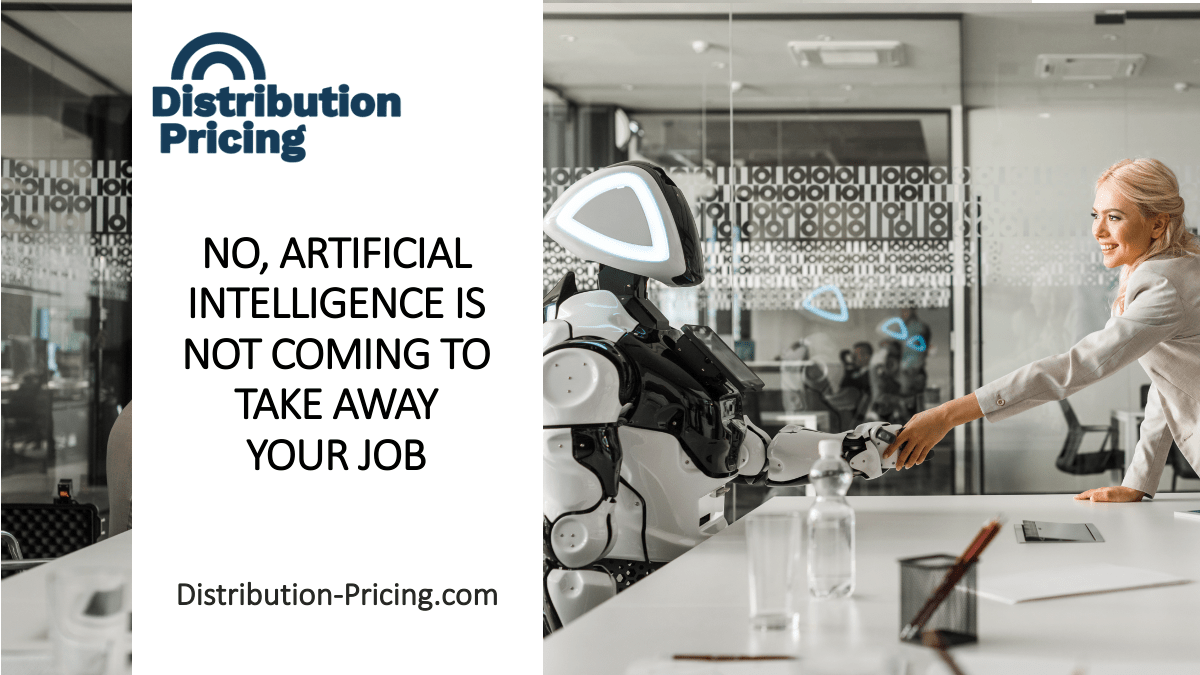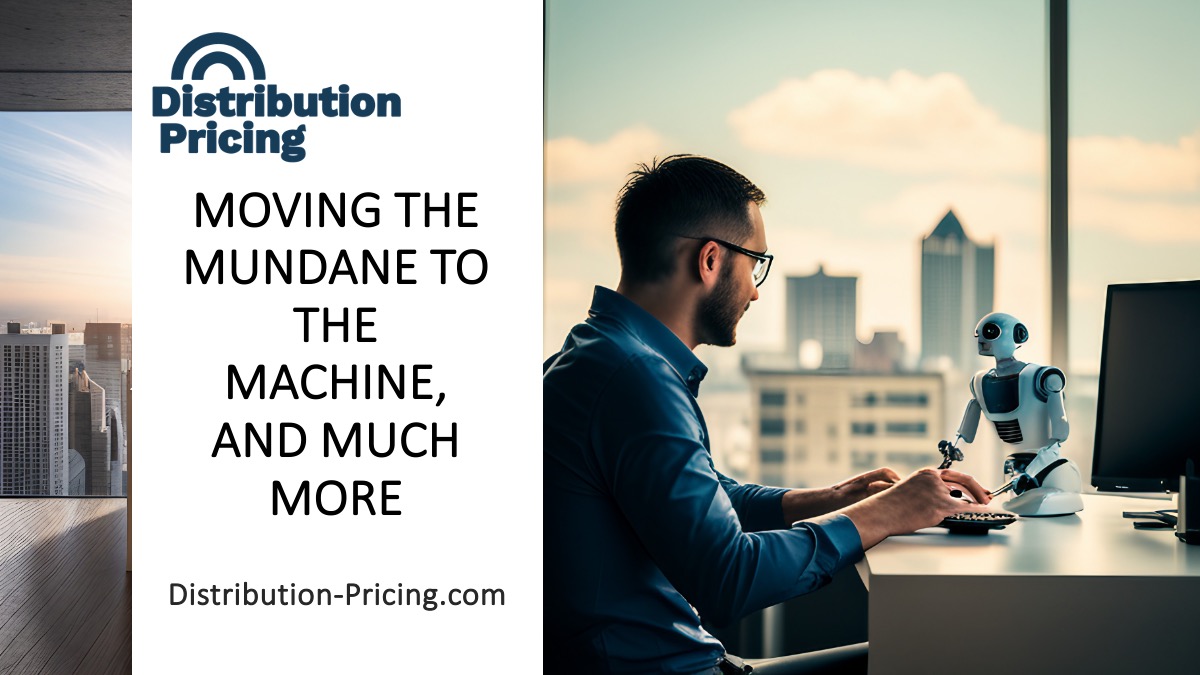Your passion for distribution pricing is what fuels our mission to deliver the most valuable and actionable insights to your inbox.

No, Artificial Intelligence is Not Coming to Take Away Your Job
Pricing managers are increasingly aware of the potential for AI to improve their work – even to the point that some are worried that AI will replace them in their jobs. This has left a lot of pricing managers feeling anxious and uncertain about the future. It’s true, AI systems can analyze and process data faster than humans, easily identify trends and automate certain data processes with greater efficiency. And with its powerful computational power and ability to learn from past data, AI can offer pricing and profitability proposals quickly and accurately – something that is worrying for many who work in this profession.
So, does artificial intelligence spell the end of your job? Of course not. At the end of the day, AI is just another tool. Workers had similar fears about the introduction of the steam engine and the personal computer.
Artificial Intelligence Can Create New Jobs
In fact, according to Daniel MacDonald, Chair of the Economics Department at California State University San Bernardino, advances in technology most likely contribute to job growth in the field of distribution pricing.
“AI is playing an increasingly important role in distribution pricing, which has led to the emergence of new job roles and professional skills in areas such as data science and model development,” says MacDonald. By utilizing AI algorithms, businesses can gain greater insights into pricing and demand trends, allowing them to make more informed decisions about product pricing. This increased efficiency has led to a growing demand for professionals with expertise in data science, machine learning, and development.
“It’s true that AI can automate processes such as running complex pricing scenarios which used to require manual labor,” says MacDonald. “But this is creating jobs that involve improving data analysis overall, monitoring the performance of existing systems or developing new ones. In this way, AI and all new technology is actually contributing to job growth by leading to new demands for jobs and skills in data science and modeling related to distribution pricing.”
Humans Will Always Maintain Unique Advantages Over the Bots
As is the case with any new technology, AI is simply not sophisticated enough to do the complicated tasks of a distribution pricing expert. Although AI is advancing every day, there are uniquely human components to pricing that will not be replaced.
Humans have an innate understanding of what factors customers consider when making purchasing decisions, such as the perceived quality of a product, its competitive advantage, and its overall value. This is something that AI systems are still unable to replicate adequately, as machines do not have the same level of emotional intelligence or natural ability for customer empathy as humans do. Therefore, pricing managers can interpret customer preferences and behavior when assessing the value of a product more effectively than an AI system can.
AI will always be reactive in terms of strategy. AI can help to automate certain tasks and identify patterns in data; however, it cannot bring the same level of creativity to pricing strategies as a human can. While AI can help to assess past trends and develop basic pricing models, humans are still better equipped at crafting innovative strategies for market expansion or diversification. This requires an understanding of customer needs and preferences that only comes from extensive knowledge of the industry as well as creative problem-solving skills which machines simply cannot mirror.
According to Matthew Turner, a leading growth strategist and founder of Boston Turner Group, there is both an art and a science required in pricing strategies. “Pricing products in distribution can sometimes seem a little bit like jazz improvisation,” says Turner. “You need a great instrument and a great knowledge of theory, both elements of a powerful AI.” But according to Turner, humans will always be able to take that knowledge a step further. “AI algorithms are powerful tools for understanding customer behavior and predicting market trends, but they do not have the same ability to react quickly as a human does. Price managers can detect changes in the market faster than a machine as they draw on their experience and knowledge of customer preferences which an AI system cannot match. “I haven’t yet seen a VP of Sales trying to spitball new job quotes or SPA ideas with ChatGPT.”
Turner adds that it is still much faster for a human to come up with these improvisations and new ideas than it is to retrain an AI algorithm on new data. The speed and agility of human decision-making when it comes to pricing strategies can often give companies the edge they need in highly dynamic markets. “AI is a tool, and in the right hands with the right human minds, it leads to high profit and competitive advantage.”
Humans Understand Other Humans
The human element in price optimization cannot be overstated. There is a lot more to segmentation and pricing that just data. Segments and pricing must make sense on a human level, where purchasing behavior intersects with the data. This is something that humans understand deeply and immediately. Despite the capability of AI algorithms to detect patterns and automatically generate pricing models, there is still a need for human involvement when it comes to pricing decisions due to the complex nature of customer interactions. Price managers must be able to interact with customers to gain an understanding of their needs and preferences which simply cannot be replicated by an AI algorithm. The ability to build meaningful relationships and trust with clients is also essential for successful pricing strategies, and this can only be done by humans. Furthermore, price managers are better positioned to make quick improvisations when needed, as well as being adept at dealing with unexpected or unforeseen circumstances.
Making Your Job Better, Faster and More Accurate Through Technology
Nelson Valderrama, CEO of Intuilize, understands the fears surrounding AI. Intuilize leads in providing AI solutions specifically designed for the distribution industry and aimed at reclaiming lost profits in pricing and inventory. “Some distributors find it alarming and distressing that AI can analyze and process data faster than humans,” says Valderrama. “AI algorithms process and analyze data quickly to provide valuable insights. But it can seem disruptive to the legacy processes in place.” According to Valderrama, it is extremely important to demonstrate the accuracy and usefulness of AI. “Humans must still step in to make key decisions when needed. But when we demonstrate the accuracy and reliability of our AI algorithms, distributors see how machines accelerate their productivity.”
Valderrama notes that people naturally feel anxious about this shift in power. The people who have made decisions in the past may find it distressing to give machines control. But AI will provide distributors with information that would otherwise be difficult for them to discover. “AI algorithms sift through vast amounts of pricing data to identify trends which may be difficult for pricing managers to spot,” says Valderrama. For instance, by leveraging machine learning, an AI system will quickly uncover the hidden correlations between data points in a dataset, connecting them in ways that would be difficult using legacy pricing and inventory methodologies.
“Pricing managers have a lot on their plate already,” says Valderrama. This creates prioritizing difficulties, given the many different possible strategies at their disposal. “What should I target next? Should I optimize my quotes? Do I try to maximize rebates or quantity breaks with discounts? How much time should I spend analyzing price overrides?” AI will drive decision-makers toward the lowest-hanging fruit. But from there human experience takes over in terms of how to put those new strategies in place.
Software like Valderrama’s Intuilize allows businesses to make more informed pricing decisions because it provides robust information to help identify the most profitable prices or discounts. AI will also capture dynamic changes in the market, offering tailor-made solutions based on real-time customer data, solutions leading to higher profits due to optimized product pricing.
Pricing Managers: AI is Not Coming for Your Job
The rise of AI has triggered hype and misinformation. But it is important to note that AI does not replace human creativity. It does not replicate human experience and interpersonal relationships, both of which remain critical to pricing strategy. AI will not take over jobs requiring complex problem-solving and creative solutions any time soon. Accepting and adopting AI may require some adjustment in thinking and the adoption of new skill sets, but intelligent machines pose no threat to workers. Humans will remain accountable for inventory and pricing decisions, but AI can ensure their efficiency, accuracy, and timeliness. People will decide what moves to make, but they will move with more confidence thanks to AI’s robust predictive analytics and forecasting.



